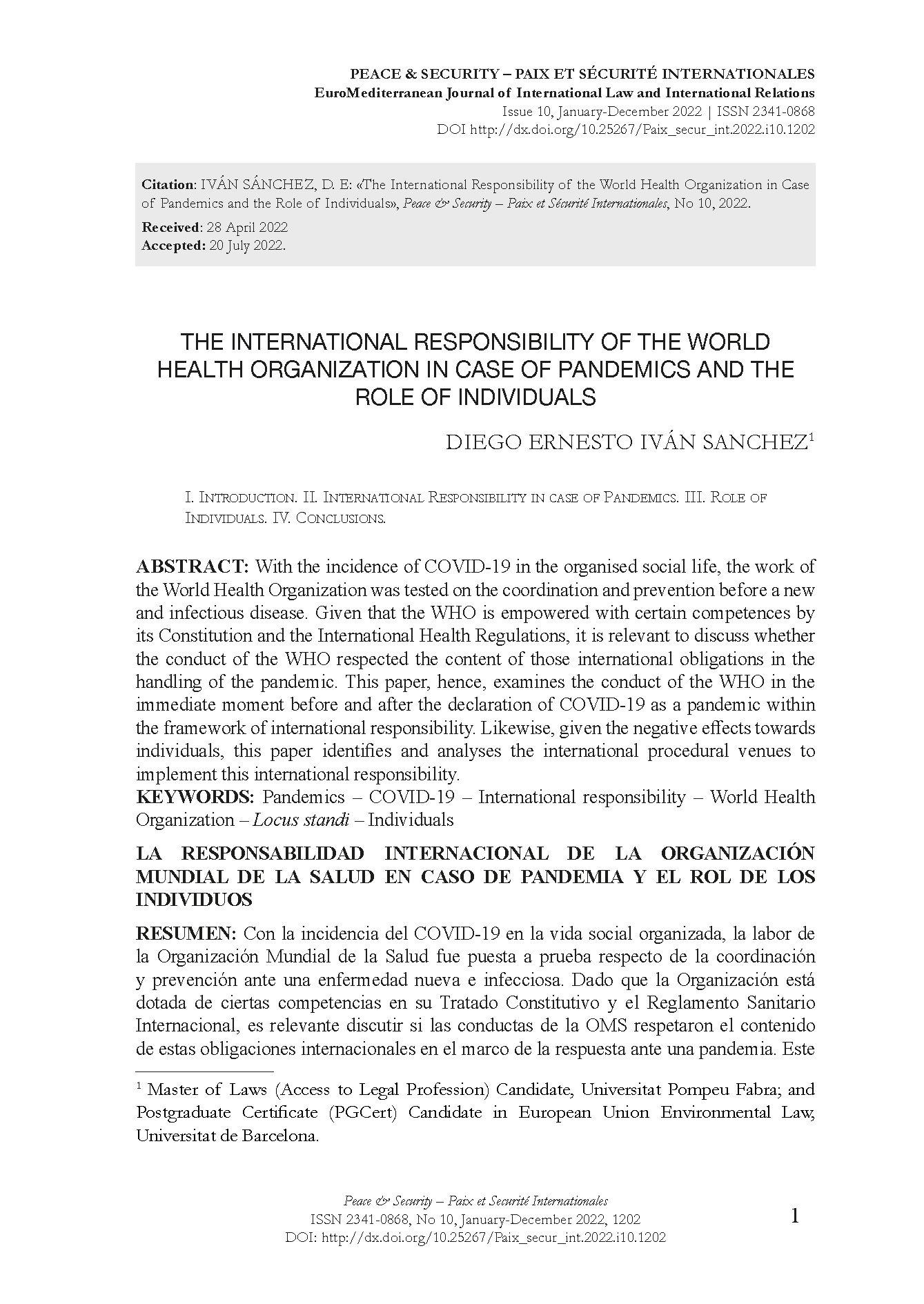The International Responsibility of the World Health Organization in Case of Pandemics and the Role of Individual
Résumé
LA RESPONSABILITÉ INTERNATIONALE DE L’ORGANISATION MONDIALE DE LA SANTÉ EN CAS DE PANDÉMIE ET LE RÔLE DES INDIVIDUS
Avec l’incidence du COVID-19 sur la vie sociale organisée, le travail de l’Organisation Mondiale de la Santé a été mis à l’épreuve en matière de coordination et de prévention face à une nouvelle maladie infectieuse. Considérant que l’Organisation possède quelques compétences sur son Constitution et le Règlement sanitaire internationale, il est relevant de discuter si les actions de l’OMS ont respecté le contenu de ses obligations internationales dans le marc de réponse d’une pandémie. Cette étude, en conséquence, examine les actions de l’OMS au moment immédiatement antérieur et postérieur à la déclaration du COVID-19 comme une pandémie dans le cadre de la responsabilité internationale. Aussi, considérant les effets négatifs sur les individus, cette étude identifie et analyse les voix procédurales internationales pour implémenter cette responsabilité internationale.
Mots-clés
Téléchargements
Comment citer
Licence
(c) Tous droits réservés PEACE & SECURITY-PAIX ET SÉCURITÉ INTERNATIONALES –EuroMediterranean Journal of International Law and International Relations 2022

Cette œuvre est sous licence Creative Commons Attribution - Pas d'Utilisation Commerciale 4.0 International.
Copyright
Es condición para la publicación que el autor o autores ceda(n) a la Revista, en exclusiva, los derechos de reproducción. Paix et Sécurité Internationales es una revista que proporciona un acceso abierto inmediato a su contenido totalmente gratuito para lectores como para los investigadores que pretendan publicar en ella, ya que no se realizan cobros por concepto de envío, procesamiento ni publicación. Los usuarios podrán leer, descargar, copiar, distribuir, imprimir, buscar o enlazar el texto completo de los artículos publicados, o utilizarlos para cualquier otro propósito, dentro de la legalidad vigente. Y podrán hacerlo sin coste alguno, y sin necesitad de solicitar permiso al editor a al autor. Todo ello de acuerdo con la definición de acceso abierto de la Iniciativa Acceso Abierto de Budapest.
Références
AGO, R., ““Binding” Advisory Opinions of the International Court of Justice”, The American Journal of International Law, vol. 85, No. 3, 1991, pp. 439-451.
ANDRUS, J., AGUILERA, X., OLIVIA, O., ALDIGHIERI, S., “Global health security and the International Health Regulations”, BMC Public Health, vol. 10, Supplement 1, 2010, 1-4, p. 2.
BROBERG, M., “A Critical Appraisal of the World Health Organization’s International Health Regulations (2005) in Times of Pandemic: It Is Time for Revision”, European Journal of Risk Regulation, vol. 11, issue 2, 2020, pp. 202-209.
BURCI, G. & FEINÄUGLE, C., “The ILC’s Articles Seen from a WHO Perspective”, in RAGAZZI, M. (Ed.), Responsibility of International Organizations. Essays in Memory of Sir Ian Brownlie, Netherlands, Martinus Nijhoff Publishers, 2013, pp. 177-88.
BURCI, G. & QUIRIN, J., “Implementation of the International Health Regulations (2005): Recent Developments at the World Health Organization”, ASIL Insights, vol. 22, issue 13, 2018.
CONTRERAS-GARDUNO, D. & ALVAREZ-RIO, I., “A Barren Effort? The Jurisprudence of the Inter-American Court of Human Rights on Jus Cogens”, in Haeck, Y., Mcgonigle, B., Burbano-Herrera, C. & Contreras-Garduno, D. (Eds.), The Realization of Human Rights: When Theory Meets Practice: Studies in Honour of Leo Zwaak, Belgium, Intersentia, 2013, pp. 113-31.
DE HERDT, S., “A Reference to the ICJ for an Advisory Opinion over COVID-19 Pandemic”, EJIL:Talk!, 20 May 2020.
DUPUY, P.-M., “Chapter II. Competence of the Court”, in Zimmermann, A., Tomuschat, C., Oellers-Frahm, K.& Tams, C. (Eds.), The Statute Of The International Court Of Justice. A Commentary. 2nd Edition, United Kingdom, Oxford University Press, 2012, pp. 584-604.
FIDLER, D., “From International Sanitary Conventions to Global Health Security: The New International Health Regulations”, Chinese Journal of International Law, vol. 4, No. 2, 2005, pp. 325-92.
FIDLER, D. & GOSTIN, L., “The New International Health Regulations: An Historic Development for International Law and Public Health”, The Journal of Law, Medicine & Ethics, vol. 34, No. 1, 2006, pp. 85-94.
GAJA, G., “The Position of Individuals in International Law: An ILC Perspective”, The European Journal of International Law, vol. 21, issue 1, 2010, pp. 11-14.
GOSTIN, L., Global Health Law. United States of America, Harvard University Press, 2014.
GOSTIN, L., “Global Health Security After Ebola: Four Global Commissions”, The Milbank Quarterly, vol. 94, No. 1, 2016, pp. 34-38.
GOSTIN, L., DEBARTOLO, M. & FRIEDMAN, E., “The International Health Regulations 10 years on: the governing framework for global health security”, Lancet, vol. 386, 2015, pp. 2222-2226.
GOSTIN, L., HABIBI, R. & MASON, B., “Has Global Health Law Risen to Meet the COVID-19 Challenge? Revisiting the International Health Regulations to Prepare for Future Threats”, The Journal of Law, Medicine & Ethics, vol. 48, issue 2, 2020, pp. 376-381.
GOSTIN, L. & KATZ, R., “The International Health Regulations: The Governing Framework for Global Health Security”, The Milbank Quarterly, vol. 94, No. 2, 2016, pp. 264-313.
MULLEN, L., POTTER, C., GOSTIN, L., CICERO, A. & NUZZO, J., “An analysis of International Health Regulations Emergency Committees and Public Health Emergency of International Concern Designations”, BMJ Global Health, 2020, pp. 1-10.
TOBIN, J., The Right to Health in International Law, United Kingdom, Oxford University Press, 2012.
TOBIN, J., “Still getting to know you: global health law and the right to health”, in BURCI, G. & TOEBES, B. (Eds.), Research Handbook on Global Health Law, United Kingdom, Elgar Publishing Ltd, 2018, pp. 56-81.
TOEBES, B., FORMAN, L. & BARTOLINI, G., “Toward Human Rights-Consistent Responses to Health Emergencies: What Is the Overlap between Core Right to Health Obligations and Core International Health Regulation Capacities?”, Health and human rights, vol. 22, No. 2, 2020, pp. 99-111.
TONTI, L., “The International Health Regulations: The Past and the Present, But What Future?”, Harvard International Law Journal, 2020.
VARGIU, P., “From Advisory Opinions to Binding Decisions: The New Appeal Mechanism of the UN System of Administration of Justice”, International Organization Law Review, vol. 7, issue 2, 2010, pp. 261-275.
ZIDAR, A., “WHO International Health Regulations and human rights: from allusions to inclusions”, The International Journal of Human Rights, vol. 19, issue 4, 2015, pp. 505-526.







